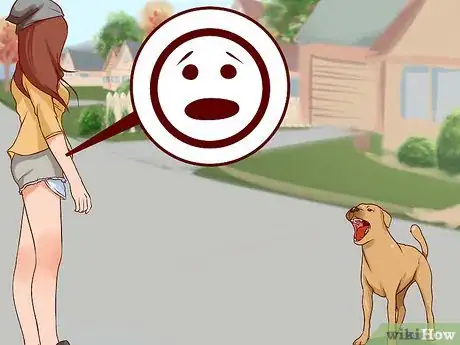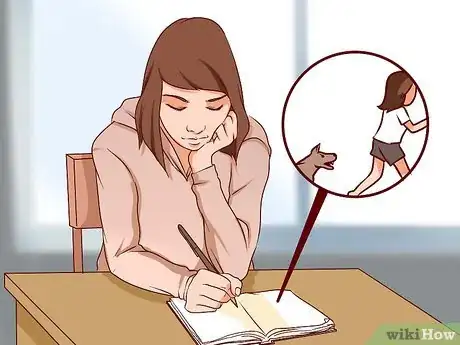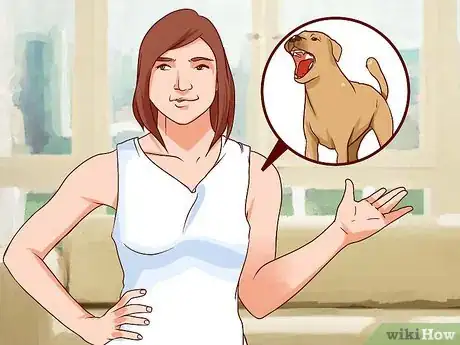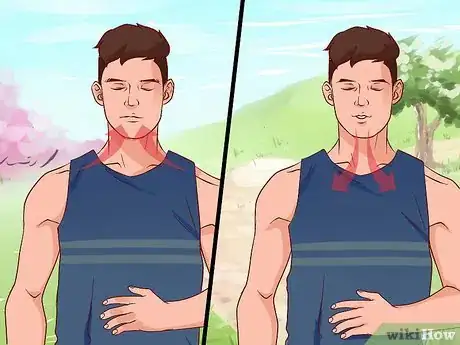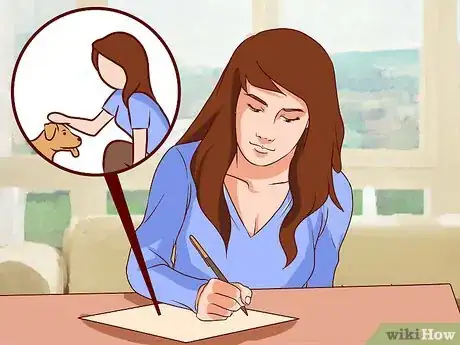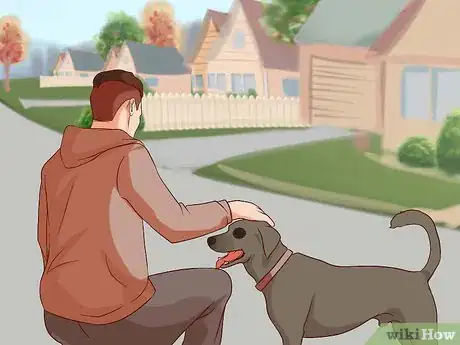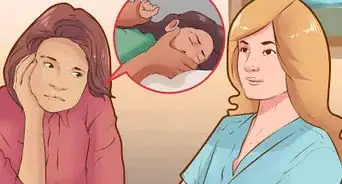This article was co-authored by Evan Parks, PsyD. Dr. Evan Parks is a Licensed Clinical Psychologist and an Adjunct Assistant Professor at The Michigan State University College of Human Medicine. With over 25 years of experience, he specializes in helping people manage chronic pain through the Acceptance and Commitment Therapy (ACT) Approach at Mary Free Bed Rehabilitation Hospital. He also has experience working with others on topics ranging from stress management to mental flexibility. Dr. Parks is also the author of Chronic Pain Rehabilitation: Active Pain Management That Helps You Get Back to the Life You Love. Dr.Parks holds a BA in Theology from Cedarville University, an MA in Counseling Psychology from Western Michigan University, and a PsyD in Clinical Psychology from The Forest Institute of Professional Psychology.
There are 18 references cited in this article, which can be found at the bottom of the page.
wikiHow marks an article as reader-approved once it receives enough positive feedback. In this case, several readers have written to tell us that this article was helpful to them, earning it our reader-approved status.
This article has been viewed 366,600 times.
A fear of dogs, also known as cynophobia, is a very common animal phobia. Animal phobias fall into a category known as specific phobias, as opposed to social phobias. A phobia, in general, is an uncontrollable, irrational and persistent fear of something (an object, situation or activity).[1] Cynophobia, specifically, is the irrational and uncontrollable fear of dogs. Different people will have different levels of fear towards dogs. Some may need to be in the presence of a dog to feel the fear, others simply need to be thinking of a dog. Whatever your level of fear towards dogs, there are ways to help you overcome that fear.
Steps
Determining the Extent of Your Fear
-
1Consider your personal history with dogs. Many, but not all, people who have a fear of dogs developed that fear when they were younger. If you experienced one of the following when you were younger, it may be the reason for your current fear of dogs.[2]
- You may have had a bad personal experience with one or more dogs in the past. You may have been scared, cornered or even bitten by a dog, and now that’s the only memory of dogs you have. Encountering a dog now may bring about the same feelings you had during that bad experience, making you scared of dogs in all circumstances.
- You may have been inadvertently taught to be afraid of dogs by someone else, such as your parents. Maybe when growing up your mom always talked negatively about dogs, or told you stories about people she knew who had been attacked by dogs. The fears she had, essentially, transferred to you. You wouldn’t have known any differently and grew up assuming dogs were terrible and you should therefore be afraid of them. It might even be possible that this anxiety is related to a disorder that you inherited genetically from your family.
- You may have witnessed something bad happen to someone because of a dog. You might have seen someone attacked and injured, or you might even seen a movie about dogs at an impressionable age. This event, whether fictional or real, may have caused you to develop a fear of dogs even though nothing ever happened to you personally.[3]
-
2Analyze your symptoms. Specific phobias, including cynophobia, may include some of the following symptoms.[4] In addition to looking at which symptoms you may experience, think about when you experience them. Do you need to be in the presence of a dog, or can a photo or story of a dog trigger your symptoms? And, is it the dog itself that causes the fear, or something the dog is doing? For example, some people are fearful of barking, but are okay if a dog is silent.
- Feeling an imminent sense of danger.
- Feeling the need to escape or flee.
- Heart racing, sweating, trembling or shaking, shortness of breath, chest pain, nausea, dizziness, or chills.
- Feeling like what is happening is unreal.
- Feeling like you’re losing control or going crazy.
- Feeling like you might die.
Advertisement -
3Determine if you change your life because of your fear. Unfortunately fears can be so severe that we feel the best way to make them go away is to avoid them completely. While a fear of flying, for example, may be quite easy to avoid by simply never flying, dogs are another story. There are over 60 million dogs in the United States alone, so the chances of being able to avoid them completely is almost impossible. Ask yourself if you do the following things in order to avoid being around dogs. If you do, there’s a good chance you have cynophobia.[5]
- Do you avoid hanging out with specific people because they have a dog?
- Do you change your route specifically to avoid a house or neighborhood that has a dog?
- Do you avoid speaking to certain people because they talk about their dogs?
-
4Understand there is a way to overcome this fear. While it is possible to overcome your fear of dogs, keep in mind that you need to be patient. It won’t go away immediately, it will take work on your part. You may want to consider seeking professional help from a therapist who can walk you through the process of overcoming your fear.
- Consider writing about your fear in a journal. Write down specific past memories that you have about dogs, and how you felt during those experiences.
- Learn relaxation and meditation techniques to help keep your calm and help control your anxiety.
- Break your fear into smaller sections to overcome; don’t think you need to tackle the whole thing all in one go.[6]
- Have faith in yourself that you will get over your fear of dogs and accept any mistakes you make along the way.
-
5Seek help from a professional therapist. While not required, a therapist will be able to help you overcome your fear and anxiety through psychotherapy. Therapists have a very high success rate treating people with phobias. Therapists will use something called Cognitive Behavioral Therapy (CBT) which can help you alter the way you think and they can teach you skills that will help you overcome your fear. They can also use exposure therapy to help you regain control of your emotions when in the presence of dogs.[7]
- Consider searching for a therapist in your area using the Anxiety and Depression Association of America's (ADAA) website at https://members.adaa.org/page/FATMain. Enter your zip code to find a list of therapists near where you live. The list of therapists provided will include which disorders each therapist specializes in so you can select someone who specializes in specific phobias or cynophobia.
Conducting Cognitive Restructuring
-
1Understand what cognitive restructuring is. Many phobias, including cynophobia, are based on how your brain comprehends a specific situation, rather than the actual situation itself. For example, you’re not likely afraid of the actual dog in front of you, but rather, you’re brain is interpreting the dog as being a threat which is then causing you to be fearful. Cognitive restructuring helps you to identify these thoughts, understand that they are irrational, and slowly help you to rethink (or reframe) your thoughts about a specific situation (i.e. dogs).
- It is important to go into cognitive restructuring with an open and willing mind. You need to accept the fact that your fear is probably not based on rational thought, and as such, means that you can train yourself to think differently. If you go into this type of treatment pessimistically or with the belief that you’re being completely reasonable in your fears, you will make the process much harder to overcome.[8]
-
2Think about events that trigger your fearful thoughts. The first step to overcoming your fear is to identify what is causing the fear in the first place. This may include thinking and talking about your past experiences with dogs, and trying to figure out what may have started the phobia in the first place. It may also include narrowing down the exact trigger that causes your fear. Is it dogs in general that cause you to be fearful, or do you become fearful when a dog does something specific (i.e. growls, barks, jumps up, runs, etc.).[9]
- This is also a chance for you and your therapist to determine if there is an underlying medical or mental condition that may be exacerbating your phobia. Underlying causes may be an anxiety disorder, depression, or maybe even a specific, yet unrelated, event that started the phobia.
- This is a great place to start a journal where you can record all the information about your fear of dogs that may be helpful for future therapy and analysis. Use your journal to record each event you can remember, and anything you can remember happening leading up to that event.
-
3Analyze your existing beliefs about your trigger events. Once you have a solid understanding of the specific events that trigger your phobia, you need to evaluate what you are thinking when this fear occurs. What are you telling yourself? How are you interpreting the trigger event in your thoughts? What are your specific beliefs about that event the moment it is happening?[10]
- Continue writing your memories and thoughts in your journal. At this point start recording the reasons why you think the events triggered your fear. Write down as many of your beliefs as you can remember.
- Analyze your beliefs and thoughts to determine if they include any of the following:[11]
- All or Nothing — do you view ALL dogs as bad, no matter what? Or do you categorize dogs differently depending on some type of feature? E.g. ”I can’t be friends with anyone who has a dog.”
- Should, Must, Ought — do you see a dog and automatically assume you have to be afraid of it? Do you feel like you have no other choice in the matter? E.g. ”My mom said I should never trust a dog.”
- Overgeneralizing — have you tried to overcome your fear before and weren’t able to, and now you assume you’ll never be able to overcome your fear of dogs? E.g. ”I tried to be near dogs before and it didn’t work. I have no choice but to be afraid of dogs.”
- Mental Filter — do you automatically draw conclusions about dogs based only on one or two previous experiences with dogs? E.g. “That dog attacked me when I was 3, all dogs are bad and will attack people if they get the chance.”
- Discounting the Positive — do you ignore something good that happened because you can’t believe it’ll happen again? E.g. ”Sure, I was able to sit beside that one dog, but he was old and sick and didn’t look like he could walk, let alone attack me.”
- Jumping to Conclusions — do you see or hear a dog and automatically draw a conclusion about what’s going to happen? E.g. ”That’s a pit bull, they’re awful and nasty dogs that can’t be trained properly.”
-
4Look at the feelings and behaviors that result from your beliefs. At this point you should have a better understanding of what triggers your fear of dogs, and the thoughts and beliefs you have about dogs when that trigger happens. Now it’s time to analyze how these thoughts and beliefs actually make you feel and behave. In other words, what are the consequences of your fear? What is the fear ‘making’ you do?
- Continue writing in your journal. At this stage you’ll want to include your reactions (both internally and externally) to the events that triggered your fear, and the beliefs that contributed to that fear.
- Examples of reactions might be:
- You were walking down your street and encountered a dog in the yard of a specific home. Afterwards you never walked down that street again.
- Your neighbour has a dog that they let into the backyard to play, so you never go in your own backyard in case your neighbour’s dog is outside.
- You refuse to go to a friend’s house because they got a dog, and you can’t hang out with them if they bring the dog along.
-
5Investigate if evidence exists to back-up your beliefs. You should now be at the point where you’ve analyzed what triggers your fear, why your fear is triggered, and how you react to that fear. Now it’s time to analyze if there’s any actual proof to back-up the reasons why you’re fearful of dogs. Think of this part of the process as you needing to be able to prove to your therapist (or yourself) that your fears are perfectly rational.[12]
- Use your journal to write down each of your beliefs and the associated evidence you have as to why that belief is reasonable and rational. If you’re a really logical person, can you find any scientific proof to back up your beliefs?
- For example, you have the belief that all dogs are going to attack you no matter what. Why do you think this is true? Have you been attacked by every single dog you’ve ever encountered? Does everyone else get attacked by every dog they encounter? Why would people own dogs as pets if they were constantly attacked?
-
6Develop a rational explanation for the trigger event. At this point you have tried to prove your fear of dogs is perfectly reasonable and found that you can’t find any evidence to back-up your beliefs. In fact, you’ve probably found evidence of the complete opposite. You now need to think about the beliefs that are causing your fear and work with your therapist to develop rational explanations for your beliefs. These rational explanations will start to make sense, and make you realize that your resulting fear doesn’t make sense.[13]
- While this may sound easy, this is going to be the hardest step in your process to overcome your fear of dogs. Our beliefs can be entrenched in our minds so deeply that it can take some time (and convincing) that they make no sense. After all, your irrational beliefs may have helped you avoid bad situations, so what’s wrong with them?
- For example, you have a belief that all dogs attack. You weren’t able to find any evidence to back up that belief, so why do you have it? Maybe your belief is based on the fact that you saw a movie when you were 7 (that you shouldn’t have watched) that had dogs attacking and killing people. After you watched that movie you started to fear dogs based on the assumption that the movie was 100% accurate. In reality, it was just a movie, and there was no truth to it and if you think about it, you’ve never actually seen a dog attack anyone.
-
7Move to the next step in your recovery. While you’ve come a long way at this point, you’re not finished. Even if you’re able to convince yourself that your fears have no rational explanation and there’s no good reason to feel the way you do, you’re not actually “cured." In a way you’ve completed the theoretical aspect of your therapy, now you have to complete the practical aspect of your therapy. At this stage you need to practice being around dogs.
- First, you need to learn how to relax when your fear or anxiety occurs so you don’t set yourself back.
- Second, you need to gradually expose yourself to dogs (in different ways) until you can feel relaxed when they’re around.
Learning Relaxation Techniques
-
1Understand the different types of relaxation techniques. There are quite a few different types of relaxation techniques that you can learn to help with your fear and anxiety. They include, but are not limited to, the following: autogenic relaxation; progressive muscle relaxation; visualization; deep breathing; hypnosis; massage; meditation; tai chi; yoga; biofeedback; and music and art therapy.[14]
- Autogenic relaxation is a technique where you use visual images and body awareness, while repeating words or terms, to help relax and reduce muscle tension.
- Progressive muscle relaxation is a technique where you tense and relax each muscle in your body in order to get a sense of what each one feels like in both a tense and relaxed state.
- Visualization is a technique where you visualize specific settings that make you feel relaxed and calm (i.e. forest, beach with waves, etc.).
- Deep breathing is a technique where you purposely breathe deeply from your abdomen in order to release tension and reverse hyperventilation.[15]
- Biofeedback is a technique where you learn to control each of your body’s functions, like your heart rate or breathing.[16]
-
2Practice deep breathing relaxation. When you’re anxious or afraid you may react by breathing too quickly and hyperventilating. Hyperventilating can intensify your feelings of anxiety and fear and make the situation worse. Breathing deeply can help you relax, reduce your tension, and make you feel less anxious. Follow these steps to relax using deep breathing:[17]
- Sit or stand somewhere where you’re comfortable and keep your back straight. Put one of your hands on your chest and put your other hand on your stomach.
- Take one slow deep breath in through your nose while counting to four. The hand on your stomach will rise while the hand on your chest shouldn’t move very much.
- Hold your breath while counting to seven.
- Exhale through your mouth while you count to eight. Push out as much air as you can using your abdominal muscles. This means the hand on your stomach should move downwards, and the hand on your chest shouldn’t move very much.
- Repeat these steps until you feel calmer and relaxed.
-
3Perform progressive muscle relaxation. Anxious people also tend to be tense, even when they think they’re relaxed. Progressive muscle relaxation can help you distinguish between relaxed and tense muscles so you actually know what it feels like to relax. Practice the following steps twice a day until you really feel it working.[18]
- Find a quiet place where you can sit comfortably with your eyes closed. Remove your shoes.
- Allow your body to go as loose as you can and take 5 deep breaths.
- Select a specific muscle group to begin with (i.e. your left foot) and focus on those muscles.
- Work each of these muscles groups: individual feet; lower leg and foot; entire leg; individual hands; entire arm; buttocks; stomach; chest; neck and shoulders; mouth; eyes; and forehead.
- Take one slow, deep breath while tensing the muscles you’ve selected for 5 seconds. Make sure you can feel the tension in your muscles before you move on.
- Allow all the tension to leave the muscles you’ve selected while exhaling.
- Pay close attention to how these muscles feels when tense and when relaxed.
- Stay relaxed for 15 seconds, then select another muscle group and repeat the same steps.
-
4Try guided visualization. Using visualization to relax is exactly what it sounds like — you visualize something that you find extremely relaxing in order to reduce your anxiety and reduce your fears. A guided visualization is where you listen to a recording where someone talks you through the process step-by-step. There are many free guided visualizations available online, some with background music or sound effects to help make the process seem more real.[19]
- Guided visualization recordings will provide the instructions on how to prepare yourself and what to do. They will also vary in length, so you can select the ones that work best for you.
Working with Exposure Therapy
-
1Develop an exposure plan. The reason you learned relaxation techniques was to keep yourself calm while slowly building up your exposure to dogs. But before you start allowing dogs to be in your presence, you need to develop a plan. This plan should include each step you’re going to go through between now (no dogs) and actually being in their presence.[20]
- Your plan should be customized for your particular type of fears, and the fearful situations you personally experience. The list should be written in order of least fearful to most fearful so you work your way up to conquering your most fearful situation.
- An example of a plan to overcome your fear of dogs is as follows:
- Step 1 - draw a dog on a piece of paper.
- Step 2 - read about dogs.
- Step 3 - look at photos of dogs.
- Step 4 - look at videos of dogs.
- Step 5 - look at dogs through a closed window.
- Step 6 - look at dogs through a partially opened window.
- Step 7 - look at dogs through an open window.
- Step 8 - look at dogs through a doorway.
- Step 9 - look at dogs from outside the doorway.
- Step 10 - look at a dog (who is on a leash) in the next room.
- Step 11 - look at a dog (who is on a leash) in the same room.
- Step 12 - sit beside a dog.
- Step 13 - pet a dog.
-
2Create and practice using an anxiety distress scale. Use the scale to measure your level of anxiety, with 0 being totally relaxed and 100 being the most fear/anxiety/discomfort you have ever experienced. This is a helpful tool for measuring how your distress levels change over time.
- The anxiety distress scale can also help you decide when it's time for you to move to the next step of your exposure plan.
- Be patient and take your time. Don't move to the next step too quickly.[21]
-
3Engage the help of a trusted friend with a dog. At some point in your plan you will have to place yourself in the presence of an actual dog. You need this dog to be handled by a competent and trustful person, and the dog needs to be predictable and well-trained. Talk to the dog’s owner in advance of executing your plan and explain to them what you’re trying to accomplish. They should be patient and understanding as they may need to simply sit there with their dog for a while as you acclimatize to the dog’s presence.[22]
- It is not a good idea to use a puppy, even if you think they’re cuter and not as violent. Puppies are not well-trained and can be quite unpredictable. This can cause them to do something unexpected in your presence which may only exacerbate your fear.
- Eventually, if you’re able to, have your friend teach you basic commands for the dog so you can control the dog yourself. Being in control of the dog may further help you to alleviate your fears once you realize you have the ability to direct their actions.
-
4Start facing your fear of dogs. Start with the first item on your plan and carry it out. Repeatedly carry it out until you feel less anxious and fearful doing it. If the step you’re doing allows you to stay in one place (i.e. watch dogs though a window), slowly expand the length of time you perform the activity as well. Use the relaxation techniques you practiced to help keep yourself calm.[23]
- Use your journal to keep track of your progress. Write down each attempt you make and how it went. Rate your level of anxiety and fear before and after each attempt.
- Remember that your exposure to dogs should be planned, prolonged and repeated.
- Don’t feel you need to rush. Take your time on each step of your plan until you feel comfortable moving onto the next step.
- If you start getting anxious, take a deep breath and stay connected to the present moment. Don't get caught up in either the past or the future.[24]
-
5Practice regularly. This part of the recovery process is going to be the hardest you’ll have to go through, but the only way it’s going to be successful is if you keep it up. Make a schedule where you practice on a regular basis. If at all possible, practice daily. Reward yourself for the progress you make. If needed, build rewards into your plan so you have an extra goal to work towards for each step.[25]
Expert Q&A
-
QuestionWhat causes a fear of dogs?
 Evan Parks, PsyDDr. Evan Parks is a Licensed Clinical Psychologist and an Adjunct Assistant Professor at The Michigan State University College of Human Medicine. With over 25 years of experience, he specializes in helping people manage chronic pain through the Acceptance and Commitment Therapy (ACT) Approach at Mary Free Bed Rehabilitation Hospital. He also has experience working with others on topics ranging from stress management to mental flexibility. Dr. Parks is also the author of Chronic Pain Rehabilitation: Active Pain Management That Helps You Get Back to the Life You Love. Dr.Parks holds a BA in Theology from Cedarville University, an MA in Counseling Psychology from Western Michigan University, and a PsyD in Clinical Psychology from The Forest Institute of Professional Psychology.
Evan Parks, PsyDDr. Evan Parks is a Licensed Clinical Psychologist and an Adjunct Assistant Professor at The Michigan State University College of Human Medicine. With over 25 years of experience, he specializes in helping people manage chronic pain through the Acceptance and Commitment Therapy (ACT) Approach at Mary Free Bed Rehabilitation Hospital. He also has experience working with others on topics ranging from stress management to mental flexibility. Dr. Parks is also the author of Chronic Pain Rehabilitation: Active Pain Management That Helps You Get Back to the Life You Love. Dr.Parks holds a BA in Theology from Cedarville University, an MA in Counseling Psychology from Western Michigan University, and a PsyD in Clinical Psychology from The Forest Institute of Professional Psychology.
Licensed Clinical Psychologist Fear of a dog, like any kind of fear, is caused by treating our thoughts, feelings, and sensations as true, valid, and important. For example, a 9-year child can watch his mother react in fear to nice, friendly dogs and then develop a fear just like hers. He has never experienced a dangerous dog before, but his mind links the word and the image of a dog with fear and danger. This link is called "fusion" in psychology, but this type of connection is not always helpful.
Fear of a dog, like any kind of fear, is caused by treating our thoughts, feelings, and sensations as true, valid, and important. For example, a 9-year child can watch his mother react in fear to nice, friendly dogs and then develop a fear just like hers. He has never experienced a dangerous dog before, but his mind links the word and the image of a dog with fear and danger. This link is called "fusion" in psychology, but this type of connection is not always helpful. -
QuestionHow do you overcome animal phobia?
 Evan Parks, PsyDDr. Evan Parks is a Licensed Clinical Psychologist and an Adjunct Assistant Professor at The Michigan State University College of Human Medicine. With over 25 years of experience, he specializes in helping people manage chronic pain through the Acceptance and Commitment Therapy (ACT) Approach at Mary Free Bed Rehabilitation Hospital. He also has experience working with others on topics ranging from stress management to mental flexibility. Dr. Parks is also the author of Chronic Pain Rehabilitation: Active Pain Management That Helps You Get Back to the Life You Love. Dr.Parks holds a BA in Theology from Cedarville University, an MA in Counseling Psychology from Western Michigan University, and a PsyD in Clinical Psychology from The Forest Institute of Professional Psychology.
Evan Parks, PsyDDr. Evan Parks is a Licensed Clinical Psychologist and an Adjunct Assistant Professor at The Michigan State University College of Human Medicine. With over 25 years of experience, he specializes in helping people manage chronic pain through the Acceptance and Commitment Therapy (ACT) Approach at Mary Free Bed Rehabilitation Hospital. He also has experience working with others on topics ranging from stress management to mental flexibility. Dr. Parks is also the author of Chronic Pain Rehabilitation: Active Pain Management That Helps You Get Back to the Life You Love. Dr.Parks holds a BA in Theology from Cedarville University, an MA in Counseling Psychology from Western Michigan University, and a PsyD in Clinical Psychology from The Forest Institute of Professional Psychology.
Licensed Clinical Psychologist Start by recognizing how quickly and easily the mind can make unhelpful connections. Our minds do this all the time, but it's only when we treat these connections as true and important that they start controlling our lives.
Start by recognizing how quickly and easily the mind can make unhelpful connections. Our minds do this all the time, but it's only when we treat these connections as true and important that they start controlling our lives.
References
- ↑ http://www.montefiore.org/psychiatry-diseases-conditions
- ↑ http://www.adaa.org/understanding-anxiety/specific-phobias
- ↑ http://www.calmclinic.com/phobias/cynophobia
- ↑ http://www.adaa.org/understanding-anxiety/specific-phobias/symptoms
- ↑ http://www.vetstreet.com/our-pet-experts/facing-fears-dog-and-cat-phobias-are-more-common-than-you-think?page=2
- ↑ http://tinybuddha.com/blog/5-steps-to-overcome-fear-and-meet-your-goals/
- ↑ http://www.adaa.org/understanding-anxiety/specific-phobias/treatment
- ↑ http://onlinelibrary.wiley.com/doi/10.1002/9781118528563.wbcbt02/full
- ↑ http://www.mayoclinic.org/tests-procedures/cognitive-behavioral-therapy/basics/what-you-can-expect/prc-20013594
- ↑ http://www.mayoclinic.org/tests-procedures/cognitive-behavioral-therapy/basics/what-you-can-expect/prc-20013594
- ↑ http://psychology.tools/unhelpful-thinking-styles.html
- ↑ http://www.mayoclinic.org/tests-procedures/cognitive-behavioral-therapy/basics/what-you-can-expect/prc-20013594
- ↑ http://www.mayoclinic.org/tests-procedures/cognitive-behavioral-therapy/basics/what-you-can-expect/prc-20013594
- ↑ http://www.mayoclinic.org/healthy-lifestyle/stress-management/in-depth/relaxation-technique/art-20045368?pg=2
- ↑ http://www.helpguide.org/articles/anxiety/phobias-and-fears.htm
- ↑ http://www.mayoclinic.org/tests-procedures/biofeedback/basics/definition/prc-20020004
- ↑ http://www.helpguide.org/articles/anxiety/phobias-and-fears.htm
- ↑ http://www.anxietybc.com/sites/default/files/MuscleRelaxation.pdf
- ↑ http://psychcentral.com/lib/guided-visualization-a-way-to-relax-reduce-stress-and-more/
- ↑ http://www.anxietybc.com/sites/default/files/adult_hmspecific.pdf
- ↑ http://www.anxietybc.com/sites/default/files/FacingFears_Exposure.pdf
- ↑ http://www.calmclinic.com/phobias/cynophobia
- ↑ http://www.anxietybc.com/sites/default/files/FacingFears_Exposure.pdf
- ↑ Evan Parks, PsyD. Licensed Clinical Psychologist. Expert Interview. 26 October 2021.
- ↑ http://www.anxietybc.com/sites/default/files/FacingFears_Exposure.pdf
About This Article
Being afraid of dogs is very common, and you can overcome your fear by learning relaxation techniques and undergoing exposure therapy. To help yourself calm down when you’re near a dog, try breathing deeply from your abdomen, which can help reverse hyperventilation. Take some time at home to practice by taking one slow deep breath in through your nose while counting to 4, holding your breath while counting to 7, then exhaling through your mouth and counting to 8. Once you’re better at deep breathing, develop an exposure plan that will slowly put you in contact with dogs. For example, start by reading about dogs, then once you’re comfortable with that, move on to looking at photos of dogs. Eventually, work your way towards petting a real dog. For more help from our co-author, like how to relax your muscles when you’re afraid, read on.
